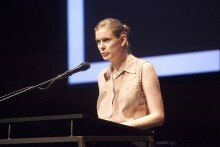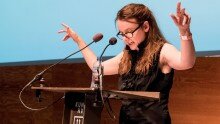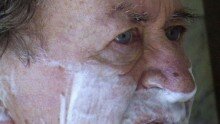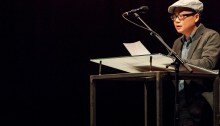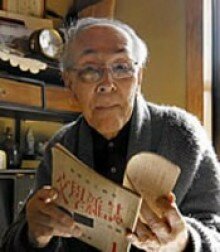
Born in 1914, Heiichi Sugiyama has lived through many dramatic changes in the cultural and social landscapes of Japan, from the liberal and lively 1910s and 1920s of the so-called ‘Taisho Democracy’, during which modernism and lyricism blossomed in the art scene, to the militaristic 1930s leading up to the catastrophic defeat in World War II and the post-war decades of ‘miracle recovery’, during which economy dominated the national mindset.
Sugiyama began as a lyric poet and movie critic in the early 1930s, lost the family business in an air raid during the war, struggled to support his family through the cash crunch, labour strikes and bankruptcy in the turbulent post-war years, and finally attained just enough security to fully engage in artistic activities in the 1960s. In fact, he had to wait for 24 years to publish his second book of poetry after the first collection which came out in 1943. Yet his poetry has surprisingly been consistent (yes, he is still writing today at the age of 97): short and crisp, witty, more visual than musical, philosophical and even metaphysical – without losing touch with day-to-day reality. In reading his poems, one meets the true self of Heiichi Sugiyama.
The eye of a cinematographer
Heiichi Sugiyama is a prominent film critic as well as an established poet. His first publication, in 1941, was a collection of film criticism – two years later, his first poetry book, Night Student, appeared. His acute visual sensitivity is clearly manifested in his poetry. Take ‘The Return of the Prodigal Son’, for example:
On earth three men are running
one has seized the moment to run away from home
one loses himself in pursuit of the thing flying in the sky
one dashes straight ahead, aiming to go home
will the prodigal son be allowed to return home?
As well as referring to the biblical parable, this poem is a visual depiction of a baseball game: with the bases full, the batter has just hit the ball high in the sky, and runners are making a dash for home base. Through the combination of the poet’s imagination and the cinematographer’s eye, an ordinary scene – and a bible story – is defamiliarised; it is this technique that gives a unique quality to Sugiyama’s poetry.
A poet with real-life experience
Sugiyama was born the son of an elite engineer who worked for a large conglomerate and later started his own manufacturing business. In his youth, Sugiyama enjoyed a privileged life as an art history student at the prestigious Tokyo Imperial University. After his father’s factory was burnt down during the war, however, Sugiyama had to give up his creative life and help rebuild the family business, which was finally declared bankrupt in 1956 after being plagued by labour disputes and finally hit by a hurricane. Through the experiences of these difficult days, he gained deep insight into and empathy with his fellow beings, as evidenced in poems such as ‘The Last Words’, which was based on his own experience of the Kobe earthquake in 1995:
She was trapped under the rubble of a building
“I’m sorry we couldn’t afford a big house.
I never earned enough.”
“I didn’t mind, honey.”
The truck driver recalls those last words he spoke with his wife
the green light, growing blurry,
comes toward him in the deep of night
A Kansai sense of humour
Although young Sugiyama was introduced to the artistic world in his Tokyo days, he has spent most of his life in and around Kobe and Osaka, the so-called ‘Kansai’ area which includes the ancient capitals of Nara and Kyoto. Kansai people are known for their talkativeness and dry, sometimes self-deprecating, humour. There is nothing verbose in Sugiyama’s poetry: it is well controlled by the aesthetic and ethical disciplines of a lyric poet. But the Kansai sense of humour is unmistakably there:
I pushed a call-button on the gate
that must have rung a bell
a lamp at the entryway came on
and I heard “who is it?”
all of a sudden a dog began to bark
a child began to cry
a voice, perhaps a mother’s, scolded
I sensed something tumbling down onto the floor
a plane roared passing above my head
I collected myself with a deep breath and said
“I am Mr. Sugiyama.”
(from ‘Visit’)
Sugiyama’s poems were translated into English by Takako Lento exclusively for this PIW issue. In fact, this publication marks Sugiyama’s first ‘visit’ to poetry readers outside Japan. We hope you enjoy the encounter.
Bibliography
Poetry
Yagakusei (Night Student), Daiichigeibunsha, Shiga, 1943
Koe wo Kagiri ni (At the Top of My Lungs), Shichosha, Tokyo, 1967
Zephyros, Choryusha, Tokyo, 1977
Sugiyama Heiichi Sishu (Heiichi Sugiyama Collected Poems), Doyoubijyutsusha, Tokyo, 1984
Konomagakure (Hiding Between Trees), Shujitsukanbo, Nagano, 1987
Sugiyama Heiichi Zenshishu (The Complete Collection of Heiichi Sugiyama Poems; two-volume book), HenshukoboNOA, Osaka, 1997
Ao wo Mezashite (Towards the Blue), HenshukoboNOA, Osaka, 2004
Sugiyama Heiichi Sishu (Heiichi Sugiyama Collected Poems), Shichosha, Tokyo, 2006
Essays
Hikuku Tobe (Fly Low), Recruit Publisher, Tokyo, 1987
Waga Haisou (My Rout), HenshukoboNOA, Osaka, 1989
Shi to Eiga to Jinsei (Poetry, Movies, and Life), Braincenter, Osaka, 1994
Mado Akete (Open the Window), HenshukoboNOA, Osaka, 2002
Sengo Kansai Shidan Kaisou (Remembrance of the Kansai-Parnassus in the postwar period), Shichosha, Tokyo, 2003
Shi to Ikiru Katachi (Way of Life with Poems), HenshukoboNOA, Osaka, 2006
Jyunkousen (A Cruise Vessel), HenshukoboNOA, Osaka, 2009
Criticism
Eiga Geijyutu e no Shoutai (Invitation to Motion Picture Arts), Kodansha, Tokyo, 1975
Eizou Gengo to Eiga Sakka (Visual Language and Movie Writers), Kyugeishuppan, Japan, 1978
Shi e no Sekkin (Access to the Poetry), Gensosha, Japan, 1980
Shi no Kokoro, Bi no Katachi (The Spirit of Poetry, the Form of Beauty), Kodansha, Tokyo, 1980
Eizou no Ronri, Shi no Ronri (The Logic of Movies, the Logic of Poems), Sogensha, Osaka, 1987
Gendaishi Nyumon (Guide to Contemporary Poetry), Sogensha, Osaka, 1988
Imamura Taihei, Libroport, Tokyo, 1990
Miyoshi Tatsuji, Fukei to Ongaku, (Tatsuji Miyoshi-Landscape and Music), HenshukoboNOA, Osaka, 1992
Eiga no Buntai (Style of Cinema), Kourosha, Shiga, 2003



